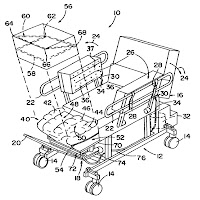Rehabilitation Research in Severe Obesity
Friday, May 23, 2008 Severe obesity, an increasingly common condition, is posing an important challenge not just for patients with this disease but also for health professionals attempting to provide the best possible care for this population.
Severe obesity, an increasingly common condition, is posing an important challenge not just for patients with this disease but also for health professionals attempting to provide the best possible care for this population.
From doors not wide enough for oversized wheelchairs to limited weight capacity of diagnostic equipment, patients with severe obesity face a wide range of important obstacles to accessing and benefiting from urgently needed health care.
We recently examined this in an article published in the Journal of Advanced Nursing, in which we reported on the need for specialized equipment and staff education to ensure adequate management of obese patients in the emergency department.
Yesterday, I attended a full-day invitation-only Think Thank on Bariatric Rehabilitation co-hosted by the Canadian Obesity Network, the University of Alberta School for Rehabilitation and Capital Health held at the TELUS Centre for Professional Development, Edmonton.
The meeting was attended by over 50 participants including University of Alberta researchers from a wide range of areas including occupational therapy, physiotherapy, rehabilitation medicine, nursing, biomechanical engineering, mechanical engineering, civil and environmental engineering, physical education, and other relevant areas.
On the Capital Health side there were several high-level administrators responsible for acute care, long-term care and community care services as well as front line health professionals from various regional hospitals and health regions.
Other stakeholders included the Canadian Association of Occupational Therapists, Emergency Medical Services as well as suppliers for bariatric equipment.
It was clear to all that there is a wide knowledge gap regarding providing the proper medical care and rehabilitative services to patients with severe obesity and that the range of challenges to the healthcare system and particularly to front-line health professionals are largely unrecognized and unstudied.
There was a consensus that bariatric rehabilitation should be high on the research agenda of various faculties within the University of Alberta and could build on many strengths in rehabilitation services that already exist within the Capital Health Region and Alberta.
I learnt a lot and look forward to working with all attendees to develop a detailed research agenda to better understand the needs and find solutions to this important but largely invisible problem.
AMS
Edmonton, Alberta


